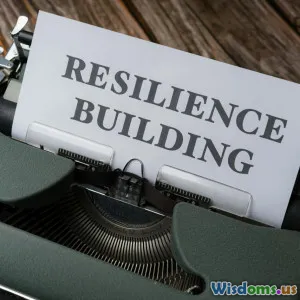
Five Ways Flexibility Can Boost Career Growth This Year
8 min read Explore how embracing flexibility can significantly accelerate your career growth with actionable strategies and real-world examples. (0 Reviews)
Five Ways Flexibility Can Boost Career Growth This Year
In an era where career paths are more fluid and the workplace is constantly evolving, flexibility is rapidly emerging as a pivotal factor for professional success. But why exactly is flexibility so important, and how can it tangibly boost your career growth this year? This detailed exploration sheds light on the transformative power of flexibility with actionable insights and examples that go beyond the generic advice.
Introduction: Flexibility—The New Career Currency
Imagine a workplace where change is constant, expectations shift rapidly, and skills that were once in demand fade within years. In such a scenario, rigid mindsets and inflexible routines not only hinder productivity but stunt professional progression. Flexibility, therefore, becomes more than an advantage—it's a necessity.
A 2023 study by LinkedIn highlighted that employees who self-identify as 'adaptable' are 30% more likely to earn promotions within two years than those with less adaptable traits. This statistic signals the critical role flexibility plays in career trajectories. Whether you are a recent graduate or a seasoned professional eyeing leadership, integrating flexibility into your professional persona can propel you forward.
1. Enhancing Adaptability in a Changing Job Landscape
The modern workplace frequently undergoes transformations driven by technology, market trends, and global shifts—like remote work dynamics or the gig economy surge. Being flexible equips professionals to adapt swiftly to altering circumstances, enabling them to maintain relevance and seize emerging opportunities.
Example: Take Sarah, a marketing professional who quickly learned data analytics and AI-based tools after her company shifted to digital marketing priority. Her openness to change and willingness to upskill paved her path for a managerial role, whereas peers who hesitated found their careers plateauing.
Scientific literature supports this benefit. According to a Harvard Business Review article, professionals who approach change with flexibility engage in "transformational learning," which allows them to reinterpret challenges as growth opportunities.
Takeaway: Build the habit of continuous learning and openness to novel experiences to reinforce adaptability.
2. Improving Work-Life Balance and Preventing Burnout
Career growth isn't solely about climbing the ladder fast; sustaining long-term productivity and well-being matters immensely. Flexibility in work arrangements—such as remote options, flexible hours, and task management—directly enhances work-life balance.
Studies from the American Psychological Association reveal that flexible work environments reduce employee burnout by nearly 40%, consequently improving engagement and innovation. Professionals experiencing better balance show heightened focus and creativity, key ingredients for standing out and advancing.
Real-world insight: Google’s flexible work policies have reportedly led to increased employee satisfaction and creativity. Employees reported feeling more in control of their schedules, which, according to Dr. Teresa Amabile, a Harvard Business School professor, leads to “greater creative output and performance.”
Actionable tip: Negotiate flexible agreements with your employer that allow incorporating personal priorities without compromising professional responsibilities.
3. Fostering Creativity and Innovation
Flexibility encourages tapping into different perspectives and approaches, which is fundamental to innovation. When professionals break free from rigid daily routines and hierarchies, they often gain the mental space to brainstorm novel solutions.
Example: Companies like 3M and Atlassian encourage flexible work hours and innovation time, leading to products like Post-it Notes and Jira software, respectively. Encouraging employees to be flexible about how and when they work sparked creativity crucial to these innovations.
From an individual standpoint, embracing flexibility might mean experimenting with cross-functional roles, taking on unconventional projects, or shifting focus from standard tasks to ideation periods.
4. Expanding Skillsets Through Diverse Experiences
A flexible approach typically involves the readiness to embrace diverse projects and roles, which naturally broadens skillsets and builds versatility.
Recruiters often rate candidates with diverse capabilities as more valuable — LinkedIn’s 2022 Workplace Learning Report showed that employees who worked across at least three different roles or departments in two years had a 25% faster career growth rate.
Example: Consider James, who started in sales but took on responsibilities in product development and customer success. His multifaceted experience positioned him as an ideal candidate for a strategic leadership role, as he understood the business from various perspectives.
Practical advice: Volunteer for cross-departmental projects or temporary assignments that challenge your skill spectrum.
5. Building Resilience for Career Longevity
Flexibility and resilience are deeply intertwined. Being psychologically adaptable helps professionals bounce back from setbacks, whether it’s job loss, project failures, or market disruptions.
Resilience is increasingly seen as a predictor of career sustainability. The World Economic Forum emphasizes resilience as a top skill needed in future workforces.
Example: During the COVID-19 pandemic, employees who adapted quickly to new remote work realities, developed digital competencies, and embraced uncertainty repeatedly secured their roles and even advanced.
To cultivate resilience, nurture a growth mindset—a belief that talents can be developed through hard work, good strategies, and input from others.
Conclusion: Embrace Flexibility as a Career Growth Strategy
The rapid shifts in the global work environment render traditional, rigid career models outdated. Flexibility stands out as a critical lever enabling professionals not only to survive but thrive and advance.
The five aspects discussed—adaptability, work-life balance, creativity, skill expansion, and resilience—not only interconnect but compound career benefits. Leaders who intentionally cultivate and exhibit flexibility become invaluable assets in their organizations and industries.
Final thought: This year, evaluate where rigidity might be holding you back and take conscious steps to become more flexible: explore learning opportunities, adjust your work habits, experiment with different roles, and foster a mindset open to change. In doing so, you unlock a powerful driver for sustained career growth.
References and Sources:
- LinkedIn Workplace Learning Report 2022
- Harvard Business Review, "How to Be More Adaptable"
- American Psychological Association, Work-Life Balance Studies
- World Economic Forum Skills Outlook 2023
- Harvard Business School Professor Teresa Amabile on Creativity
- Company case studies: Google, 3M, Atlassian
By leveraging flexibility, your career path can transform into a dynamic journey filled with growth, resilience, and fulfillment.
Rate the Post
User Reviews
Other posts in Work-Life Balance
Popular Posts
















